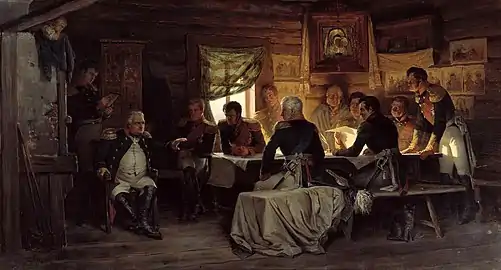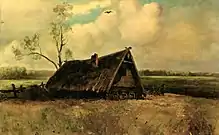Council at Fili
The Council at Fili was a military council, which, in accordance with the Military Charter, was convened on September 13, 1812 during the Patriotic War of 1812 by Commander-in-Chief Mikhail Kutuzov in the village of Fili, west of Moscow.

The question was asked whether, after the Battle of Borodino that did not reveal the winner, to try to give another battle near Moscow or to leave the city without a fight.
On the eve of the council
On the eve of the council, formations of the Russian Army were located west of Moscow to give battle to Napoleon's troops. The position was chosen by General Leonty Bennigsen. Despite a severe fever that tormented him for several days, Barclay de Tolly inspected the battlefield on horseback and came to the conclusion that the position was fatal to the formations of the Russian army. The same conclusions after him came, having traveled to the location of the Russian troops, to Alexei Ermolov and Karl Tol. In the light of these reports, Kutuzov faced the question of the need to continue the retreat and surrender of Moscow (or giving a battle right on the streets of the city).
Course of the council in Fili
The council was attended by generals Mikhail Barclay de Tolly, delayed on the way Leonty Bennigsen, Dmitry Dokhturov, Alexei Ermolov, Peter Konovnitsyn, Alexander Osterman-Tolstoy, Nikolay Raevsky, who was very late,[1] Karl Tol, Fedor Uvarov, and General Paisiy Kaysarov who was on duty that day.[2] There was no protocol. The main sources of information about the council are the memoirs of Raevsky and Ermolov, as well as a letter from Nikolai Longinov to Semyon Vorontsov in London.
Bennigsen, who opened the meeting, formulated a dilemma – to give battle in an unfavorable position or to surrender the ancient capital to the enemy. Kutuzov corrected him that it was not about saving Moscow, but about saving the army, since you can count on victory only if the combat-ready army is preserved. Barclay de Tolly proposed retreating to the Vladimirsky Tract and further to Nizhny Novgorod, so that in the event of Napoleon's turn to Petersburg, he would have time to block his path.
In his speech, Bennigsen announced that the retreat makes senseless bloodshed in the battle of Borodino. The surrender of the sacred to the Russian city will undermine the fighting spirit of the soldiers. Great will be purely material losses from the ruin of noble estates. Despite the onset of darkness, he proposed to regroup and attack the Great Army without delay. Bennigsen's proposal was supported by Yermolov, Konovnitsyn, Uvarov and Dohturov.
The first to speak in the debate was Barclay de Tolly, who criticized the position near Moscow and suggested retreating: "Having saved Moscow, Russia is not saved from a cruel, ruinous war. But if we save the army, the hopes of the Fatherland are not yet destroyed, and the war... can continue with convenience: the prepared troops will have time to join in different places outside Moscow".[3]
Osterman-Tolstoy, Raevsky and Tol spoke for the fact that Russia is not in Moscow. The latter pointed out that the army exhausted by the battle of Borodino was not ready for a new equally large-scale battle, especially since many commanders were disabled by wounds. At the same time, the army's retreat along the streets of Moscow will make a painful impression on the townspeople. To this Kutuzov objected that "the French army will dissolve in Moscow like a sponge in the water", and offered to retreat to the Ryazan road.

Based on the opinion of the minority of those present, Kutuzov decided not to let the battle take place in an unsuccessful position, to leave Moscow (because, in his words, repeating Barclay de Tolly, "with the loss of Moscow, Russia is still not lost") in order to save the army to continue the war, and at the same time get closer to suitable reserves. This decision required a certain courage, since the measure of responsibility for the surrender of the historical capital to the enemy was very large and could result in the resignation of the commander-in-chief. No one could predict how this decision would be taken at court.
After the council in Fili
At the end of the council, Kutuzov summoned the quartermaster-general Dmitry Lansky and ordered him to ensure the supply of food on the Ryazan road. At night, the adjutant of Kutuzov heard him cry. The army, which was preparing for battle, was ordered to retreat, causing widespread bewilderment and grumbling. Retreat in the city was carried out at night. The decision to retreat was taken aback by the Moscow authorities, headed by Count Fedor Rostopchin.
After two day crossings, the Russian army turned from the Ryazan road to Podolsk onto the old Kaluga road, and from there onto the new Kaluga one. As part of the Cossacks continued to retreat to Ryazan, the French scouts were disoriented, and Napoleon for 9 days had no idea about the whereabouts of the Russian troops.[4]
Memory of the council
The Council at Fili was described by Leo Tolstoy in the novel War and Peace. Based on the Tolstoy literary basis, the artist Alexei Kivshenko painted two paintings of the same content depicting the main characters on the 70th anniversary of the council, the first in 1880 (stored in the Russian Museum), the second in 1882 (Tretyakov Gallery).[5]
In the tradition of Tolstoy and Kivshenko, the council is depicted in the epic of Sergei Bondarchuk "War and Peace" (1967). For reasons of economy of timing, among all the council members in the film, the word was given only to Kutuzov and Bennigsen (the latter speaks Russian on the movie screen, which he did not actually speak).[6]
The hut of the peasant Mikhail Frolov (often mistakenly called Andrei Sevastyanovich Frolov or, following Leo Tolstoy, Andrei Sevastyanov),[7] in which the council took place, burned down in 1868, but was restored in 1887, since 1962 – a branch of the Borodino Panorama Museum. Reliably the initial appearance of the hut is known thanks to a number of studies carried out in the 1860s by Alexei Savrasov.
See also
References
- When Raevsky arrived at the meeting, Ermolov briefly brought him up to date.
- In some sources, among those present, Matvey Platov and Mikhail Miloradovich were mistakenly mentioned.
- Sergey Nechaev. Barclay de Tolly [Text] – Moscow: Young Guard, 2011 – 331 Pages – (The Life of Wonderful People; Issue 1528 (1328)) – ISBN 978-5-235-03468-6
- Radio Echo of Moscow: Not So. September 22, 2012, 14:05. Council at Fili: Alexander Valkovich
- Kivshenko Alexey Danilovich in the Great Soviet Encyclopedia, 1969–1978 (Russian)
- Sergey Solovyov. Emperor Alexander I. Politics, Diplomacy
- Mikhail Prokhorov. New Documents on the Owners of the Kutuzov // Patriotic War of 1812. Sources. Monuments. Problems – Borodino, 1997